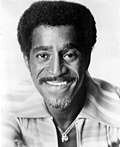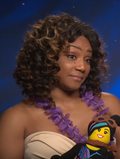African-American Jews
People who are both African American and Jewish From Wikipedia, the free encyclopedia
African-American Jews are people who are both African American and Jewish, whether by mixed ancestry or conversion. African-American Jews may be either Jewish from birth or converts to Judaism. Many African-American Jews are of mixed heritage, having both non-Jewish African-American and non-Black Jewish ancestors. Many African-American Jews identify as Jews of color, but some do not. Black American Jews from Africa, such as the Beta Israel from Ethiopia, may or may not identify as African-American Jews.
It has been suggested that Black Jews in New York City be merged into this article. (Discuss) Proposed since April 2025. |
History
Summarize
Perspective
Early history

Jews with African ancestry have lived in the Americas since the colonial era. Black Jews during the colonial era were often enslaved people or their descendants. Before the 1820s, the largest Jewish communities in the Americas were in the Caribbean, as were the largest communities of Jews with ancestral ties to Africa.[1]
Some early African-American Jews came to the United States from Jamaica[2] and Barbados.[3] The portraits of Sarah Brandon Moses and Isaac Lopez Brandon, both born enslaved in Barbados, are the oldest known paintings of Jews with African ancestry.[3] Caribbean Jews both became members of white-run Jewish synagogues in the United States and helped form early African-American synagogues in Harlem in the first part of the 20th century.[citation needed]
Several historic Jewish congregations in the United States mention early African-American worshippers.[4] Lucy Marks (?-1838), who lived with and worked for the Marks family of Philadelphia, was known as a "devout observer of the precepts of Judaism" and sat in the women's section of Mikveh Israel during services. Upon her death, the Marks family successfully petitioned to have her buried in the Spruce Street Cemetery, where today she rests in an unmarked grave next to Haym Salomon.[5] Billy Simmons (?-1860) attended services at Beth Elohim in Charleston, South Carolina, even though its constitution forbade converts with African ancestry from being members.[6][4]
By the first part of the 20th century, at least eight different African-American run religious organizations self-identified as Jewish. Most traced or claimed connections either to the Caribbean or Ethiopia.[4] Today African-American Jews worship both in predominantly African-American congregations and predominantly mixed congregations.
Contemporary African-American Jews
Musician Lenny Kravitz (whose father was of Ukrainian-Jewish ancestry)[7] refers to himself as being "half-Jewish"[8]
Singer, actor, and comedian Sammy Davis Jr., who was a convert to Judaism
Actress and comedian Tiffany Haddish, who converted to Judaism after learning that her late father had been African Jewish[12]
Rapper Drake[13] (a dual-citizen of Canada and the United States), born to an African-American father[14] and a Canadian Ashkenazi Jewish mother[15] and an adherent of the Jewish faith since youth[16]
Actress and filmmaker Rashida Jones is the daughter of an African-American father (Quincy Jones) and an Ashkenazi Jewish mother (Peggy Lipton),[17] and was raised in the tradition of Reform Judaism[18]
Actress and comedian Maya Rudolph is the daughter of a Jewish father (Richard Rudolph) and an African American mother (Minnie Riperton)
Ice hockey player Jordan Harris is the son of an African-American Jewish father and was raised Jewish[19]
Feminist activist Rebecca Walker,[20] the daughter of an African-American mother (Alice Walker) and Jewish father (Melvyn R. Leventhal)[21]
British politician Oona King, the daughter of an African-American father (Preston King) and British Jewish mother[22]
The American Jewish community includes Jews with African-American backgrounds. African-American Jews belong to each of the major American Jewish denominations—Orthodox, Conservative, Reform—and the smaller movements as well, such as Reconstructionist or Humanistic.[citation needed] Like their other Jewish counterparts, there are African-American Jewish secularists and African-American Jews who may rarely or never take part in religious practices.[23]
In 1963, the Central Conference of American Rabbis issued a responsa written by Rabbi Solomon Freehof titled "Miscegenation and Conversion of Negroes", stating that there was no prohibition in Reform Judaism against interracial marriage, citing the marriage of Moses to Zipporah, an Ethiopian woman. The responsa describes the conversion of African-Americans to Judaism as a "troublesome situation", because a "Negro becoming a Jew subjects himself to double difficulties." Freehof wrote that he would discourage an African-American man who wanted to marry a Jewish woman "For the sake of their happiness", but would not refuse.[24]
Robin Washington, an American journalist and filmmaker, became one of three founders of the National Conference of Black Jews, later called the Alliance of Black Jews. It was conceived to build bridges among all African-American Jews, who are affiliated with many different groups. Estimates of the number of black Jews in the United States range from 20,000[25] to 200,000.[26]
There are several predominantly African-American Jewish or Black Hebrew Israelite congregations in the United States, most of which are affiliated with the Black Hebrew Israelite movement. Most notably, Beth Shalom B'nai Zaken Ethiopian Hebrew Congregation is a Black Hebrew Israelite synagogue in Chicago, Illinois. The congregation leader of Beth Shalom is Conservative Rabbi Capers Funnye, a Black Hebrew Israelite leader. Its assistant rabbis are Avraham Ben Israel and Joshua V. Salter.[27] The congregation, which has about 200 members, is mostly African-American.[28][29] The congregation was started by Rabbi Horace Hasan from Bombay (now Mumbai), India, in 1918 as the Ethiopian Hebrew Settlement Workers Association,[30] and it was influenced by Wentworth Arthur Matthew's Commandment Keepers.[28][29]
Shais Rishon, a Black Orthodox Jewish writer and activist, has stated that the "mainstream normative Black Jewish community" is distinct from the Black Hebrew Israelite movement and that Black Hebrew Israelites do not share the same identity, community, or issues as Black Jews. Rishon objects to the erasure of Black Jews, saying that Black Hebrew Israelites are not a denomination of Judaism and that the two communities are commonly confused or conflated.[31]
See also
- Alliance of Black Jews
- African American–Jewish relations
- Black Hebrew Israelites – groups of African Americans who believe that they are the descendants of the ancient Israelites
- Black Judaism
- Darhe Jesarim
- History of the Jews in Africa
- History of the Jews in Suriname
- Jewish diaspora
- Jewish ethnic divisions
- Jewish history
- List of African-American Jews
- Black Jews in New York City
- Black, White, and Jewish
- Religion of Black Americans
- The Whipping Man
References
Further reading
External links
Wikiwand - on
Seamless Wikipedia browsing. On steroids.









